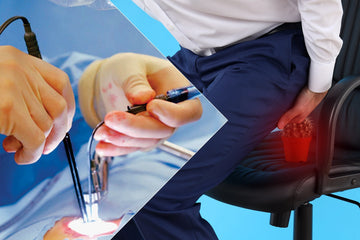Piles, also known as hemorrhoids, are swollen blood vessels in the rectal or anal area. They can cause discomfort, pain, itching, and bleeding, significantly affecting daily life. While surgery is often recommended in severe cases, many people successfully manage and even reverse piles through natural and Ayurvedic remedies. These non-invasive approaches not only alleviate symptoms but also target the root cause, offering long-term relief without the risks associated with surgical procedures.
In this blog, we’ll explore how to manage piles naturally, emphasizing the wisdom of Ayurveda, dietary changes, lifestyle habits, and herbal remedies that promote healing and prevent recurrence.
Understanding the Root Causes
Before diving into remedies, it’s important to understand what leads to the development of piles. Some common causes include:
-
Chronic constipation or diarrhea
-
Straining during bowel movements
-
Sedentary lifestyle
-
Low-fiber diet
-
Obesity
-
Pregnancy
-
Prolonged sitting, especially on the toilet
Ayurveda identifies piles (called Arsha in Sanskrit) as an imbalance in the body’s doshas, particularly Vata and Pitta. This imbalance leads to poor digestion, constipation, and the accumulation of toxins, ultimately causing inflammation and swelling in the rectal veins.
Natural and Ayurvedic Ways to Manage Piles Without Surgery
1. Dietary Adjustments
A high-fiber, well-balanced diet is the cornerstone of non-surgical piles management. Fiber softens stool, reduces straining, and prevents further irritation. Key dietary tips include:
-
Eat more fruits and vegetables: Apples, papayas, bananas, figs, spinach, and carrots are excellent choices.
-
Include whole grains: Brown rice, oatmeal, barley, and whole wheat are fiber-rich.
-
Stay hydrated: Drink at least 8–10 glasses of water daily to ease bowel movements.
-
Avoid spicy and oily food: These irritate the digestive tract and worsen symptoms.
-
Limit caffeine and alcohol: They can dehydrate the body and cause constipation.
2. Ayurvedic Remedies
Ayurveda offers various herbs and formulations to soothe symptoms, improve digestion, and strengthen rectal veins. Some of the most effective include:
-
Triphala: A natural laxative that helps regulate bowel movements and detoxifies the gut.
-
Haritaki: Known to relieve constipation and improve digestion.
-
Arshoghni Vati: A classic Ayurvedic formulation used specifically for treating piles.
-
Kachnar Guggul: Helps reduce inflammation and supports vein health.
-
Neem & Turmeric: Known for anti-inflammatory and antiseptic properties; useful for external application and internal cleansing.
Many Ayurvedic products are now available in capsule, tablet, or powder form, making them easier to integrate into your daily routine.
3. Topical Applications
For immediate relief from pain, itching, or swelling, topical treatments can be highly effective:
-
Witch hazel: A natural astringent with anti-inflammatory effects.
-
Aloe vera gel: Soothes irritation and promotes healing.
-
Sesame oil with turmeric: Helps reduce inflammation and fights infection.
-
Ayurvedic creams: Formulations containing ingredients like Haridra (turmeric), Yastimadhu (licorice), and Lajjalu (touch-me-not plant) offer localized relief.
Apply these gently after cleaning the area with warm water and drying it properly.
4. Lifestyle Changes
Improving daily habits is essential to prevent the recurrence of piles and support healing:
-
Avoid prolonged sitting: Especially on the toilet. Use a footstool to achieve a squatting position, which makes bowel movements easier.
-
Exercise regularly: Simple activities like walking, yoga, and pelvic floor exercises stimulate digestion and reduce pressure on rectal veins.
-
Don’t delay bowel movements: Ignoring the urge can worsen constipation.
-
Use warm sitz baths: Sitting in a tub of warm water for 10–15 minutes can reduce swelling and promote blood circulation.
-
Wear loose, breathable clothing: Cotton underwear and loose-fitting pants can reduce irritation and help healing.
5. Herbal Supplements and Medicines
In addition to diet and lifestyle, many people benefit from over-the-counter herbal medications. Products like Him Arogya PILEXA are specifically formulated to treat piles without surgery. These blends typically include time-tested herbs like Nagkesar, Daruhaldi, Triphala, and Haritaki, which help reduce swelling, stop bleeding, and promote healthy digestion.
Such remedies, when used under the guidance of an Ayurvedic practitioner, are safe and effective for long-term use.
When to Seek Medical Attention
While natural and Ayurvedic treatments can be very effective, there are times when medical consultation becomes necessary. You should see a doctor if:
-
You experience heavy rectal bleeding
-
There’s a noticeable lump that becomes painful or doesn't reduce with time
-
Symptoms persist despite consistent natural treatment
-
There is excessive discomfort affecting sleep and daily functioning
In such cases, a doctor may recommend minimally invasive procedures like rubber band ligation, sclerotherapy, or infrared coagulation, still less intense than surgical hemorrhoidectomy.
Final Thoughts
Managing piles without surgery is possible for most people, especially when caught early. With the right combination of high-fiber foods, Ayurvedic herbs, lifestyle improvements, and effective products like Him Arogya PILEXA, you can find relief, prevent recurrence, and restore comfort to your life naturally.
Ayurveda doesn’t just treat the symptoms—it balances the body’s systems from within, promoting true and lasting healing. So if you’re struggling with piles, let nature be your first line of defense before considering surgical options.








